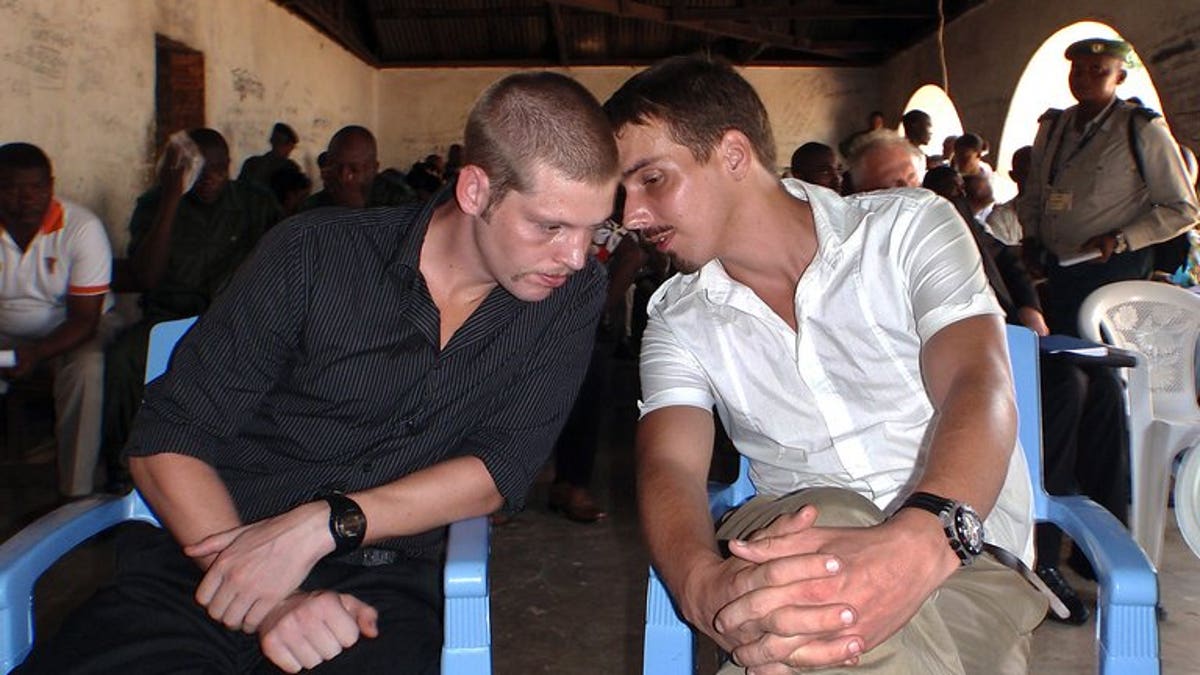
Joshua French (L), who has dual British Norwegian nationality, and Norway's Tjostolv Moland, 29, speak on June 10, 2010 as they sit at court in Kisangani, northeastern Democratic Republic of Congo. Moland, a Norwegian sentenced to death in 2010 for murder and spying in the Democratic Republic of Congo, has died in prison, Norway's foreign minister announced on August 18, 2013. (AFP/File)
KINSHASA (AFP) – The Democratic Republic of Congo was on Monday investigating the death of a Norwegian prisoner, whose family accused Oslo of "having blood on their hands" for failing to secure his extradition.
The body of Tjostolv Moland was discovered early Sunday in his death-row jail cell in the Congolese capital Kinshasa, government spokesman Lambert Mende told AFP.
"The first clues are being examined to find out whether (it was) murder or suicide. The doctor required by the Norwegian consulate has examined the corpse. The body has been taken to the Mama Yemo hospital for an autopsy," he added.
Moland, 32, and his friend Joshua French, 31, who has dual Norwegian-British nationality, were sentenced to death in June 2010 after being convicted of spying and of killing the Congolese driver of a car they had rented.
The men, both former soldiers, denied the charges and said the driver was killed by bandits. They said they had come to DR Congo to set up a security firm.
"The other Norwegian (French) is being questioned by magistrates in the presence of his lawyer and somebody from the consulate," Mende said.
On Sunday, Norwegian Foreign Minister Espen Barth Eide announced Moland's death but gave no indication of the cause. A Norwegian diplomat had been sent to the jail, he added.
Shortly after their conviction Moland and French wrote to DR Congo President Joseph Kabila to ask for a pardon or for their death sentences to be commuted to life imprisonment that could eventually be served in Norway.
Moland's father lashed out at the Norwegian government on his blog, saying he had begged them to intervene in the case.
"They did nothing. Now they have Tjostolv's blood on their hands," Knut Moland wrote on his blog on Sunday.
On Monday, Eide told AFP that he understood "the frustration and despair of a father who finds himself in the tragic situation of having lost his son."
"However I must specify, hand on heart, that Norwegian authorities have never exerted as much effort and energy in an affair of this kind," the foreign minister added.
No executions have been carried out in DR Congo since Kabila came to power in 2001, and death sentences have regularly been commuted to life imprisonment.
Penal facilities in the vast country date from Belgian colonial times and are decrepit and overcrowded. Inmates are exposed to disease, dehydration and starvation. Rights groups report that prisoners can die of hunger or torture.
According to the UN mission in DR Congo, MONUSCO, the number of deaths in prison "almost doubled in 2012" and conditions remain "extremely precarious in the vast majority of detention centres".
